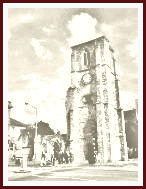Start | R Gordon | T Banbury | R O Taylor | C L Barnes | C C Douce | A Cole
England 1867-85
Soon after his arrival, Gordon preached at Holy Rood Church in the centre of Southampton.
The Falmouth Post reported 'Mr Gordon is well read in the Hebrew scriptures, understands Latin and Greek, and is able to converse in both Italian and French, in addition of course to English. Of his proficiency in the latter many persons

ruins of Holy Rood, Southampton
were able to judge on Sunday evening last, as the reverend gentleman occupied the pulpit in Holy Rood Church, preaching a sermon which would have done credit to the head and heart of the most favoured of the human race. He possesses a loud and resonant voice, gives every word a distinct and careful utterance, and lays his subject before his hearers with a comprehensiveness yet simplicity of matter which cannot fail to impress itself upon the ear and command the attention of every listener.'
Daily Gleaner, September 6, 1867
THE REVD. ROBERT GORDON.
The arrival of the Revd. Robert Gordon in England has attracted the attention of the home authorities. A private letter received in this city, states that much surprise has been expressed in England that Mr. Gordon should have been allowed to leave Jamaica without having received any address from the inhabitants. Immediately on it becoming known to Sir Henry Storks that the Revd. gentleman had arrived in England, Sir Henry warmly interested himself in behalf of Mr. Gordon and wrote to his Grace the Duke of Buckingham, recommending Mr. Gordon to his attention; His Grace therefore communicated with Mr. Gordon inviting him to an interview, and desiring that he should bring his credentials with him. Mr. Gordon had a lengthy interview with his Grace at the Colonial Office. The Duke promised the Revd. gentleman that he would do all in his power to forward his interest. His Grace the Archbishop of Canterbury has licensed Mr. Gordon to preach in the United Church of England and Ireland, under the broad seal of the Primate; and the Bishop of London had sent an affectionate letter to Mr. Gordon. Mr. Gordon had been invited by several Clergyman of note to preach in their respective places of worship.
Gordon's last seven years:
I have not found any information on Robert Gordon's final years. After his last actions at St John the Evangelist, Drury Lane, in September 1878, there seems to be no information until his death in March 1885. I searched records physically when I was doing research in London in the 1990s, and I have tried all the sources I can think of on the Internet, still without success. I have not been able to identify any further record of his service at any church, and, strangely, I have been unable to find any record of him in the 1881 U K census records, though he was recorded in the 1871 census. On his death certificate his address was given as 59 Guildford Street, Russell Square, but there is no way of telling how long he had lived there. The address was a 'good' one at the time, and it is possible he was being supported by some of his English friends. According to that certificate,he died of 'Phthisis pulmonalis Pneumonia' and it seems that a post mortem was done by J K Fowler, the doctor at the Middlesex Hospital who signed the death certificate. When 'Phthisis pumonalis' or tuberculosis is untreated, and there were no effective treatments in the 1880s, 50% of its victims die within two years of diagnosis, so it is likely that Gordon had been obviously ill for a year or more, but it is not possible to say that illness was the reason for the lack of evidence of his service at any church. I hope more information will materialise on this period of his life.Two interesting notes can be made on some of this information:
James Kingston Fowler became a well-known authority on TB and visited Kingston in July 1924 to attend an important conference on Tropical Medicine.
The Trinidadian writer J J Thomas followed much the same path as Gordon five years later:
'In 1888 he [J J Thomas] was forced to go to England for treatment. He spent the winter and the following spring living in Guildford Street, off Russell Square and within easy reach of the British Museum, an area of London to become so familiar to later generations of West Indian students. It was at this point having conquered Froude as it were that Thomas turned his attention once again to the Creole Grammar. . . . He never completed it. He was admitted to King's College Hospital and diagnosed with tuberculosis. He died the same year. Thomas was 49.'


